Discover how Augustus, Rome's first emperor, transformed a turbulent post-Caesar era into the thriving Pax Romana through strategic alliances, decisive battles, and sweeping reforms.
Unveil the legacy of a ruler whose visionary leadership laid the foundation for Rome's golden age and centuries of prosperity.
Early Life and Upbringing
Born as Gaius Octavius in 63 BC, Augustus' early life was shaped by his grandmother Julia due to his mother's remarriage. This familial dynamic positioned him within the influential Julian lineage, inherently linking him to Rome's political landscape. His upbringing in such an environment allowed him to witness firsthand the complexities of Roman politics and military affairs.
The assassination of Julius Caesar in 44 BC was a pivotal moment for Augustus. As Caesar's adopted son, he inherited not only Caesar's name but also his political and military ambitions. This connection afforded him access to substantial resources and the loyalty of many Caesarian supporters, vital in a time when Rome was teetering between a republic and a potential dictatorship.
Augustus' early political acumen was evident as he gathered an army using Caesar's funds, forming strategic alliances that were instrumental in the ensuing civil wars. His alliance with Cicero, who opposed Mark Antony as a threat to the republican order, further cemented his standing.
Through calculated military and political maneuvers, Augustus navigated the tumultuous period following Caesar's death, laying the groundwork for his future role as Rome's first emperor and transforming the Roman Republic into an empire.
Rise to Power
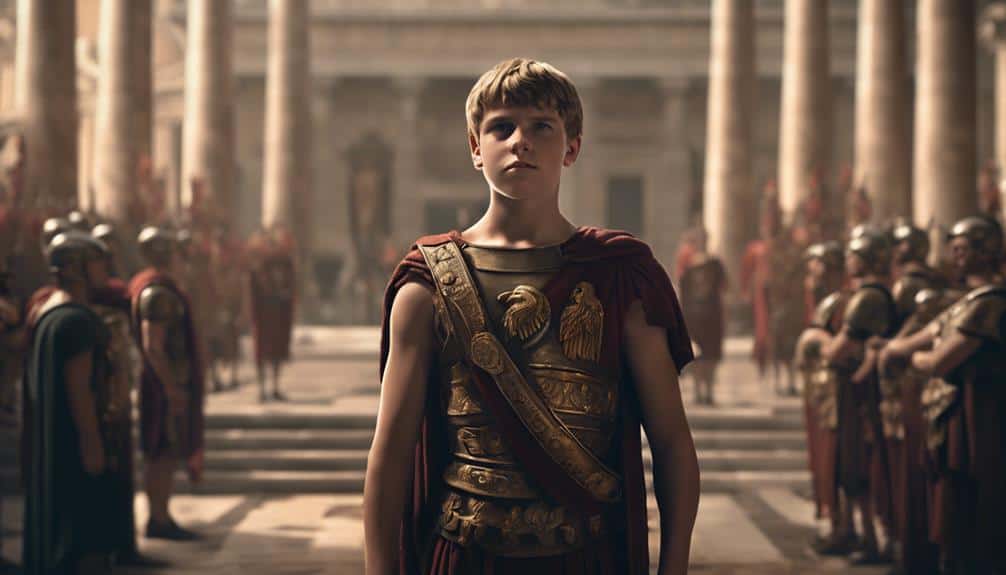
To understand Augustus' rise to power, you must consider his early life events, strategic alliances, and military victories.
His appointment as Julius Caesar's heir set the stage, while his alliances with key figures like Mark Antony and Lepidus fortified his position.
Ultimately, his decisive win at the Battle of Actium cemented his authority and paved the way for his transformative rule.
Early Life Events
Gaius Octavius, who'd later become known as Octavian and eventually Augustus, leveraged his connection to Julius Caesar and the resources left to him to rapidly ascend the political ladder in Rome. Born in 63 BC, Octavius was raised by his grandmother Julia. After Julius Caesar's assassination in 44 BC, Octavius adopted the name Octavian and asserted his claim to power using Caesar's funds to gather an army.
In Rome, he formed an uneasy truce with Mark Antony, gaining the support of Caesarian veterans and senators who opposed Antony. This strategic maneuvering led to the establishment of the Second Triumvirate in 43 BC, a political alliance between Octavian, Mark Antony, and Marcus Lepidus, aimed at restoring order to the fractured Republic.
Octavian's military acumen was demonstrated at the Battle of Actium in 31 BC, where he triumphed over Mark Antony. This decisive victory allowed Octavian to consolidate power and effectively end the Roman Republic, paving the way for his transformation into the first emperor of Rome.
His rise from a relatively obscure youth to the architect of the Roman Empire underscores the interplay of ambition, strategic alliances, and military prowess in his early life.
Strategic Alliances Formed
Octavian's path to power was marked by astute strategic partnerships, beginning with his alignment with Caesarian veterans and senators who viewed Mark Antony as a threat to the republican order. These early partnerships played a vital role in gathering both military support and political backing. By securing the loyalty of seasoned soldiers devoted to Julius Caesar, Octavian guaranteed a formidable force to counter Antony's influence.
Cicero's vocal criticisms of Mark Antony further strengthened Octavian's position, portraying Antony as a danger to Rome's stability. This rhetoric was crucial in swaying public and senatorial opinion in Octavian's favor. Recognizing the need for a broader coalition, Octavian then formed the Second Triumvirate with Antony and Lepidus. This political maneuver not only consolidated his power but also allowed him to legally pursue and eliminate their mutual enemies.
The strategic partnerships Octavian forged were instrumental in his rise to power. They provided him with the necessary resources to challenge Antony effectively. Ultimately, these partnerships culminated in Octavian's decisive victory at the Battle of Actium, setting the stage for his transformation into Augustus, Rome's first emperor.
These partnerships exemplify his political acumen and ambition.
Military Victories Achieved
Augustus' military victories, highlighted by his triumph at the Battle of Actium, were pivotal in establishing his dominance and shifting Rome from a republic to an empire. By defeating Mark Antony and Cleopatra in 31 BCE, he not only eliminated his primary rivals but also consolidated power, marking the end of the tumultuous civil wars that had plagued Rome. This decisive victory allowed Augustus, previously known as Octavian, to shift Rome into a period of relative peace and stability known as the Pax Romana.
The Battle of Actium was more than just a military success; it signified a turning point that enabled Augustus to establish strategic alliances, thereby securing his position as Rome's first emperor. These alliances were essential in maintaining the newfound peace and prosperity across the Roman Empire. Augustus' methodical approach to military strategy and his ability to forge key partnerships ensured that he could effectively govern and protect the empire's expansive territories.
Through his military triumphs, Augustus laid the foundation for a stable and prosperous era, demonstrating how military prowess and strategic acumen can transform the fate of an entire civilization. His victories were instrumental in ushering in the long-lasting Pax Romana, which defined his legacy.
Establishing the Roman Empire

After defeating Mark Antony at the Battle of Actium in 31 BCE, Augustus laid the groundwork for establishing the Roman Empire through a series of strategic reforms and territorial expansions. By restructuring the fragmented remains of the Roman Republic, Augustus transformed it into a centralized imperial system.
His reforms included reorganizing the Senate, which had become inefficient and corrupt. Augustus made certain that its members were loyal and capable, thereby stabilizing the political landscape.
He also expanded the empire's territories, securing borders and integrating new provinces. This territorial expansion further solidified his power and resources, enabling the establishment of a more robust and resilient empire.
Augustus' policies marked the beginning of the Pax Romana, a period of relative peace and stability that lasted for over two centuries.
Upon his death in CE 14, the Senate proclaimed Augustus a Roman god, cementing his legacy as the first emperor of the Roman Empire. His transformation of the Roman Republic into a thriving empire set a precedent for future emperors and established a lasting foundation for Roman governance.
The Pax Romana

You'll find that the Pax Romana marked a transformative period where Augustus's strategies established not just peace, but also economic and cultural growth.
His reforms stabilized Rome, fostering an environment conducive to prosperity and artistic flourishing.
Establishment of Peace
The Pax Romana, a hallmark of Augustus's reign, signified a transformative period of stability and prosperity for the Roman Empire, marked by minimal military conflict and significant administrative reforms. Augustus symbolized peace by closing the Gates of Janus three times, indicating victory over opponents and a state of tranquility in Rome. This era, known as Pax Romana, saw the establishment of a unified and secure Roman Empire under Augustus's leadership.
Key to this peace was the Ara Pacis, a monumental altar commissioned by the Senate in 13 BCE. It served as a powerful propaganda tool, showcasing Augustus's accomplishments and the prosperity brought about by his rule. The altar reflected themes of fertility, abundance, and conquest, reinforcing the narrative of a peaceful and thriving empire.
Augustus's reforms were pivotal in maintaining this tranquility. He restored the facade of the Republic, reformed taxation, and established a standing army to secure Rome's borders. His legal and administrative changes shifted Rome from a republic to an empire, ensuring long-term stability.
The Pax Romana stands as a testimony to Augustus's ability to foster peace through strategic reforms and symbolic gestures.
Economic and Cultural Growth
Augustus's reign during the Pax Romana spurred unprecedented economic growth and cultural flourishing, laying the groundwork for Rome's golden age. As the emperor of the Roman Empire, Augustus implemented reforms that secured long-lasting economic prosperity. His efforts in infrastructure development, such as roads, aqueducts, and ports, facilitated trade and communication, essential for a thriving economy.
Stability under his rule allowed for significant technological advancements and remarkable architectural achievements, exemplified by structures like the Pantheon and the Forum of Augustus. These projects not only showcased Roman engineering prowess but also reinforced the notion of a unified and powerful empire.
Cultural imperialism flourished during this period, with Roman influence permeating various aspects of daily life, from clothing styles to literature. The flourishing of Roman culture was evident in the works of poets like Virgil and Ovid, who found patronage under Augustus's regime.
This cultural and economic boom wasn't just a fleeting moment; it laid the foundation for what would be remembered as Rome's golden age. Though the Pax Romana ended with the death of Marcus Aurelius, the legacy of Augustus's era of peace and prosperity left an indelible mark on history.
Military Reforms
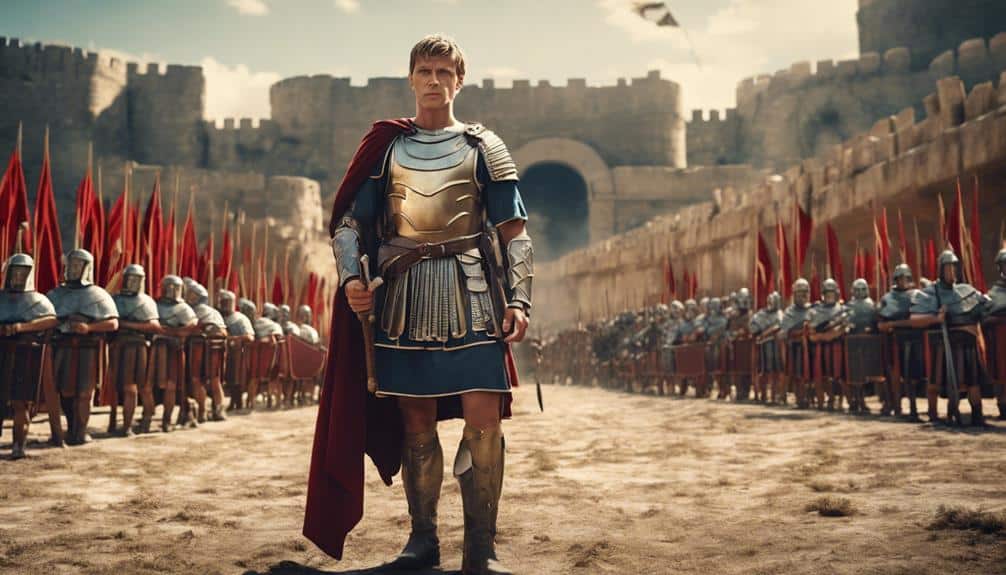
By transforming the Roman army from a citizen militia into a professional standing force, Augustus implemented military reforms that were vital for the stability of the Empire. These reforms guaranteed the Roman Empire's security and laid the groundwork for the Pax Romana, a period of relative peace and prosperity.
Augustus established a professional standing army, which was a significant shift from the previous reliance on temporary citizen soldiers. This change provided the Roman Empire with a more reliable and disciplined military force. Additionally, he created the Praetorian Guard, an elite unit tasked with protecting the emperor and maintaining order in Rome. This special force played an essential role in ensuring the emperor's safety and bolstering internal stability.
To secure the Empire's frontiers, Augustus strategically stationed legions at key border locations. This deployment was vital for maintaining border security and deterring potential invasions. By having a constant military presence at the edges of the Empire, Augustus guaranteed that any threats could be promptly addressed, contributing to the overall stability of the Roman Empire.
Augustus' military reforms were instrumental in maintaining peace and order, helping to establish a long-lasting period of stability known as the Pax Romana.
Economic Prosperity
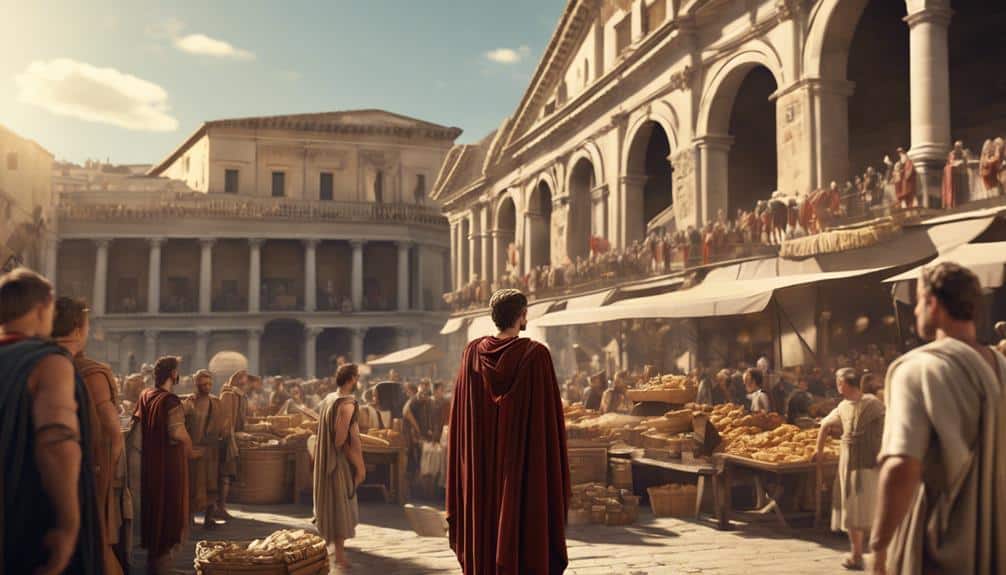
Amidst the backdrop of political stability and military security, Augustus spearheaded significant economic reforms that transformed the Roman Empire into a hub of prosperity and trade. Central to this economic prosperity were the 50,000 miles of new roads Augustus oversaw, vastly improving trade and communication across the Empire. These roads facilitated long-distance trade, making it easier for goods to move efficiently.
Political stability encouraged money lending, further boosting economic activity. Augustus cleared the Mediterranean of pirates with the Roman navy, guaranteeing safe sea commerce. This move was pivotal, as it allowed merchants to trade without fear, bolstering the Empire's wealth.
Infrastructure projects under Augustus, such as aqueducts, bridges, and harbors, were key to stimulating trade and economic development. These public works not only improved daily life but also created jobs and encouraged local commerce. The construction of stadiums and bathhouses also spurred economic activity, attracting visitors and boosting spending in urban areas.
Augustus' reforms secured that the Roman Empire could maintain and grow its prosperity. By enhancing trade routes, securing sea lanes, and investing in infrastructure, Augustus laid the groundwork for an economically vibrant and interconnected Empire.
Cultural and Technological Advancements

Under Augustus' reign, the Roman Empire experienced a remarkable period of cultural and technological advancements. This era was characterized by the flourishing of literature, the innovation in construction techniques, and the spread of Roman cultural practices across the Empire.
Roman literature thrived during this period. Augustus commissioned works like Virgil's Aeneid, which became cultural cornerstones. These literary achievements reflected and reinforced Roman values and ideals, contributing significantly to cultural advancements.
Technological advancements were equally transformative under Augustus. The development of concrete construction enabled the creation of revolutionary architectural forms such as arches and domes. These innovations allowed for the building of impressive infrastructure, including stadiums, forums, and bathhouses, which enhanced the urban landscape and functionality of Roman cities.
Cultural imperialism under Augustus was pervasive, with Roman hairstyles, clothing, literature, and theater spreading across the empire, influencing various regions and integrating them into the Roman cultural sphere.
Additionally, sea commerce flourished as the Roman navy, under Augustus' directives, cleared the Mediterranean of pirates, ensuring safe and thriving trade routes. This not only boosted economic prosperity but also facilitated the exchange of cultural and technological advancements throughout the empire.
Therefore, Augustus' reign marked a pivotal era of cultural and technological progress in Roman history.
Legacy and Succession
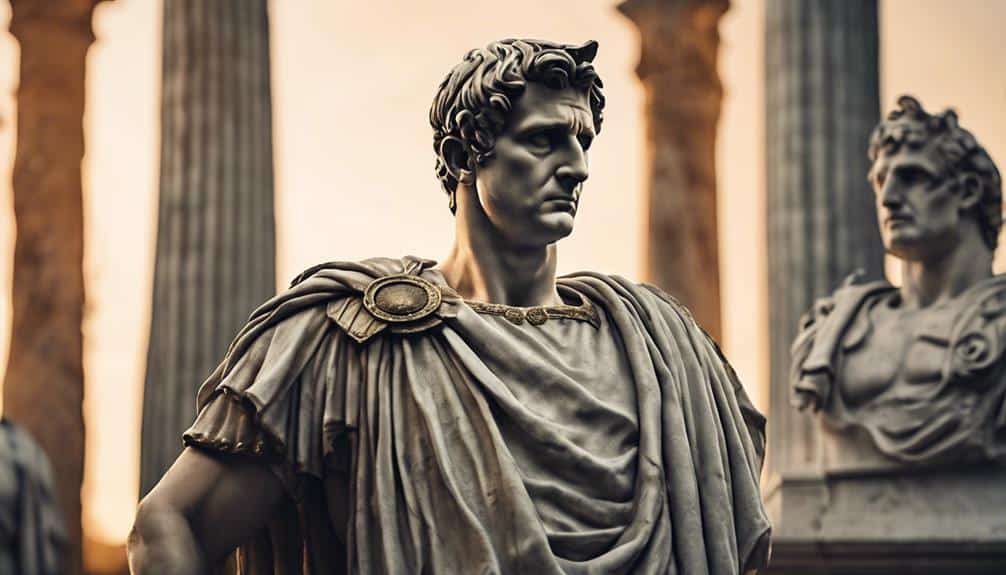
As Augustus's reign brought unprecedented cultural and technological advancements to Rome, his strategic planning for succession secured the stability and continuity of the Empire through his carefully selected heir, Tiberius. By orchestrating a smooth handover, Augustus guaranteed that the peace and prosperity of his rule would persist beyond his lifetime. This careful succession planning was vital in maintaining the imperial peace established during his reign.
The Second Settlement played a pivotal role in this process. By granting Augustus legislative supremacy and expanding his authority, it laid the groundwork for a stable and effective transfer of power. When Augustus passed away in AD 14, Tiberius, his stepson, smoothly ascended to the throne, marking a notable moment in Roman history.
Augustus's legacy is also immortalized in the Ara Pacis Augustae, a monument that symbolizes the peace and prosperity of his reign. This structure stands as a tribute to the ideals of the Pax Romana and the enduring impact of Augustus's governance.
Through these strategic measures, Augustus's legacy of stability and continuity was firmly established, ensuring the Empire's resilience in the face of future challenges.
Lasting Impact on Rome
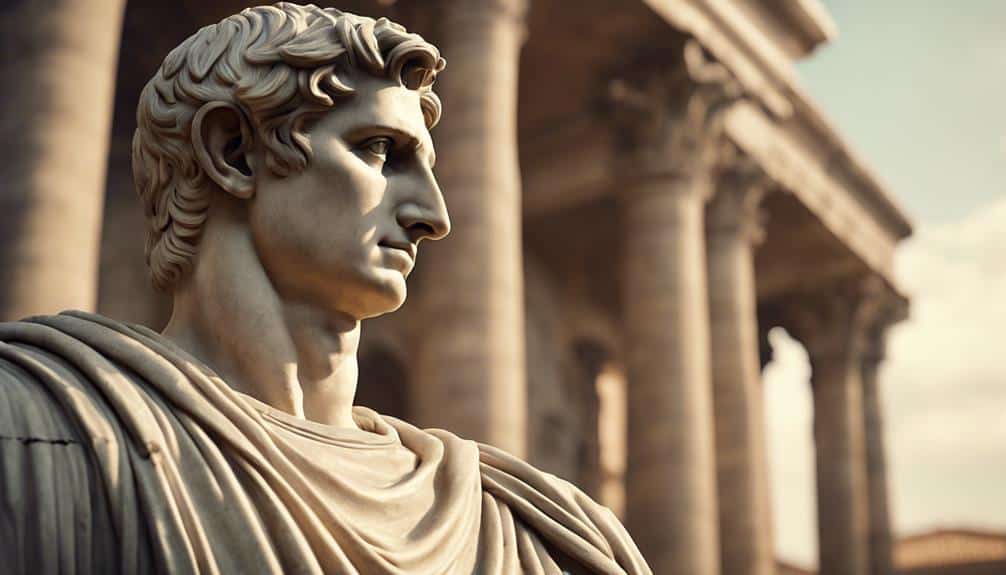
Augustus's profound impact on Rome is evident through his establishment of the Pax Romana, which ushered in an era of unprecedented peace and stability across the Empire. This period allowed for extensive reforms that shaped Rome for generations. By shifting from the Roman Republic to the Roman Empire, Augustus centralized power, ensuring a more cohesive and efficient governance structure.
He reformed Roman taxation, creating a more consistent and fair system that bolstered the Empire's finances. This, in turn, funded significant public works projects, including roads, aqueducts, and buildings that improved infrastructure and quality of life. Augustus also developed a standing army, providing defense and maintaining order throughout the vast territories.
Moreover, Augustus's focus on public works demonstrated his commitment to Rome's physical and social rejuvenation. He famously declared he found Rome a city of bricks and left it a city of marble. Essential services like policing and firefighting were established, further contributing to the Empire's stability.
The Pax Romana, initiated by Augustus, laid the foundation for future emperors to build upon. His blend of centralized power, innovative reforms, and public investment left a lasting legacy, profoundly influencing the Roman Empire's trajectory.


